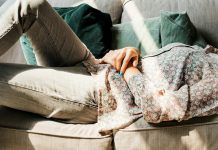
In a new study from Michigan State University, researchers found that a nap during the day won’t restore a sleepless night.
They found that short naps of 30 or 60 minutes did not show any measurable effects.
Slow-wave sleep, or SWS, is the deepest and most restorative stage of sleep.
It is marked by high amplitude, low-frequency brain waves and is the sleep stage when your body is most relaxed; your muscles are at ease, and your heart rate and respiration are at their slowest.
SWS is the most important stage of sleep. When someone goes without sleep for a period of time, even just during the day, they build up a need for sleep; in particular, they build up a need for SWS.
When individuals go to sleep each night, they will soon enter into SWS and spend a substantial amount of time in this stage.
In this study, the team wanted to know if a short nap during a sleep deprivation period would reduce these deficits.
They recruited 275 college-aged participants for the study.
The participants completed cognitive tasks in the evening and were then assigned to three groups:
The first was sent home to sleep; the second stayed at the lab overnight and had the opportunity to take either a 30 or a 60-minute nap, and the third did not nap at all in the deprivation condition.
The next morning, participants reconvened in the lab to repeat the cognitive tasks.
The team found the group that stayed overnight and took short naps still suffered from the effects of sleep deprivation and made much more errors on the tasks than their counterparts who went home and obtained a full night of sleep.
However, every 10-minute increase in SWS reduced errors after interruptions by about 4%.
These numbers may seem small but when considering the types of errors that are likely to occur in sleep-deprived operators—like those of surgeons, police officers or truck drivers—a 4% decrease in errors could potentially save lives.
Individuals who obtained more SWS tended to show reduced errors on both tasks. However, they still showed worse performance than the participants who slept.
The team hopes that the findings underscore the importance of prioritizing sleep and that naps—even if they include SWS—cannot replace a full night of sleep.
If you care about sleep, please read studies about a better way to treat sleep loss, insomnia and findings of sleep too little or too much linked to this deadly lung disease.
For more information about sleep and your health, please see recent studies about this common sleep habit may strongly harm your heart health and results showing that this herb may help you sleep better.
The study is published in Sleep. One author of the study is Kimberly Fenn.
Copyright © 2021 Knowridge Science Report. All rights reserved.



